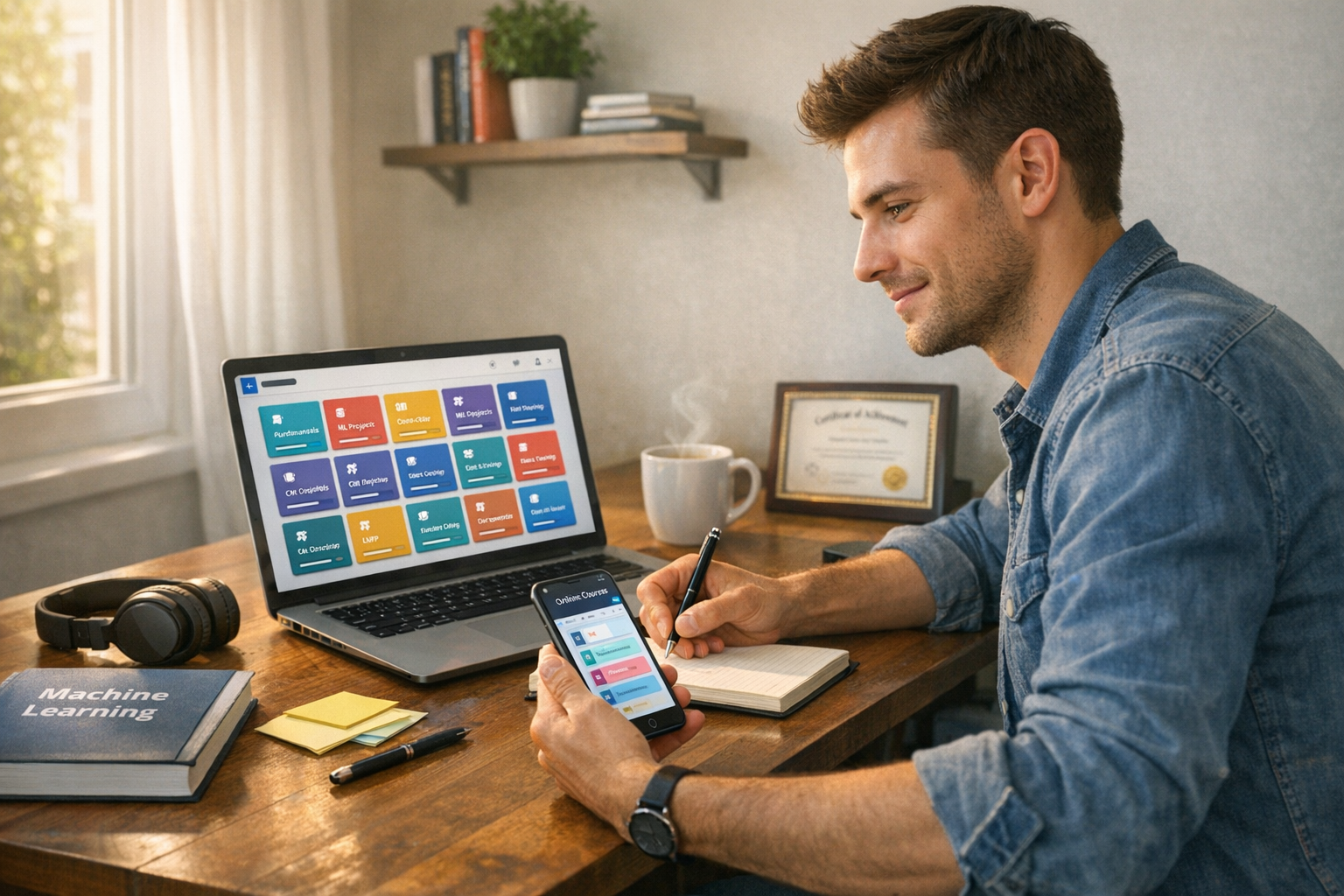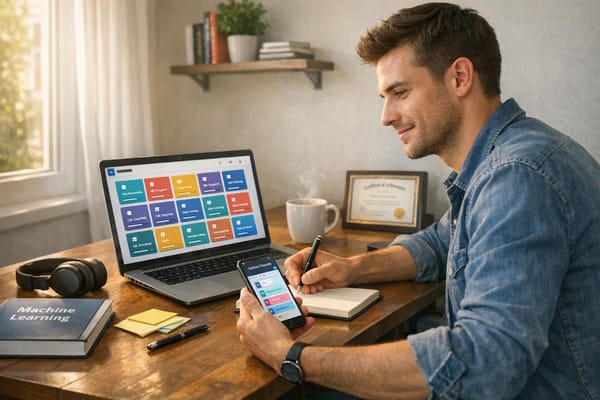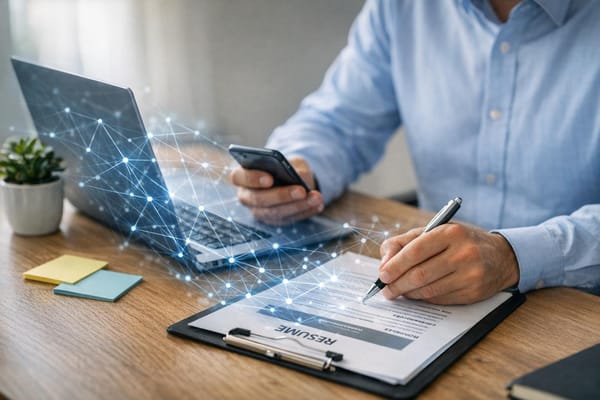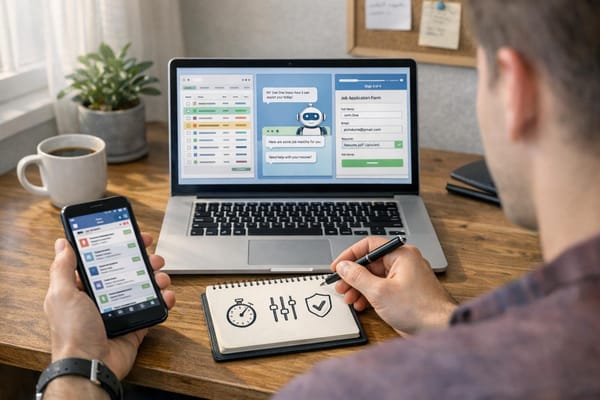5 Post-Interview Thank You Email Templates
Stand out after your job interview with these 5 effective thank you email templates and tips for crafting the perfect follow-up message.
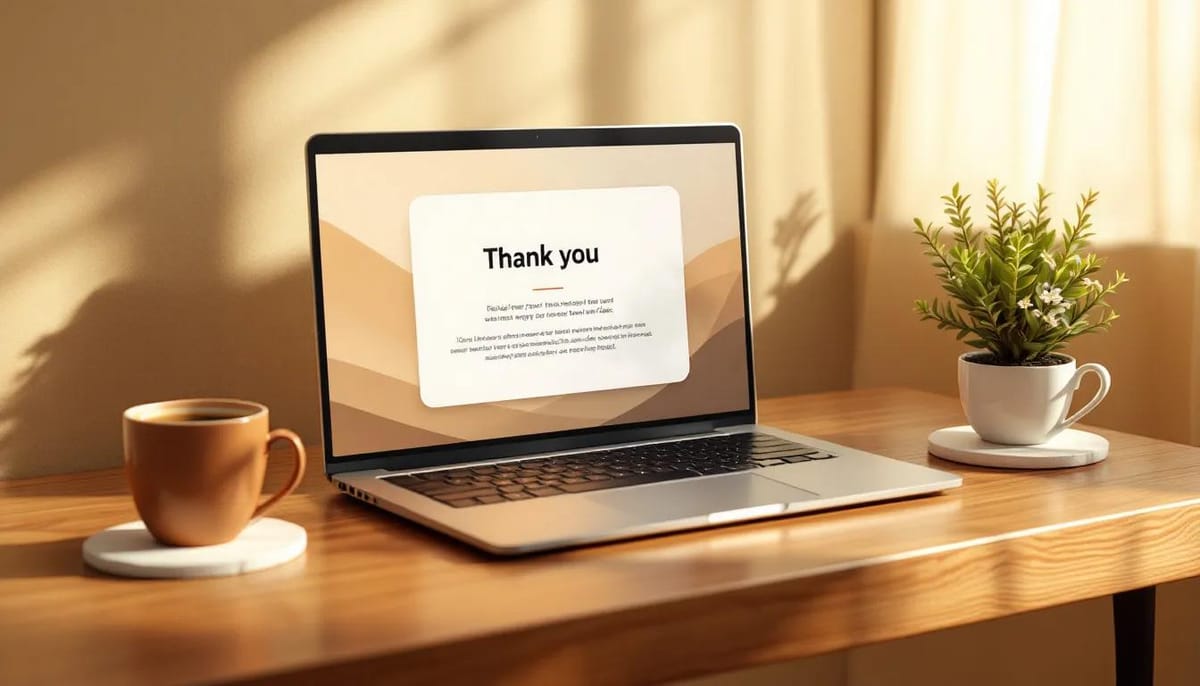
Want to stand out after a job interview? Send a killer thank you email. Here's why it matters:
- Only 25% of candidates send them
- 80% of HR pros say they influence hiring decisions
- It's your chance to address any interview hiccups
Here are 5 templates to nail your post-interview follow-up:
- Basic Thank You: Short, sweet, and personal
- Group Interview: Highlight points from each interviewer
- Technical Interview: Showcase your problem-solving skills
- Second Interview: Reinforce why you're the perfect fit
- Online Interview: Address any tech issues and restate key points
Key tips:
- Send within 24 hours
- Personalize each email
- Keep it short (3 paragraphs max)
- Proofread carefully
Remember: A well-crafted thank you email can be the tiebreaker in landing your dream job.
Related video from YouTube
Why Thank You Emails Matter
In today's job market, a thank you email after an interview can make or break your chances. It's not just good manners - it's a smart move that can boost your odds of landing the job.
When to Send Your Email
Timing is key. Aim to send your email within 24 to 48 hours after your interview. This keeps you fresh in the interviewer's mind without seeming too eager. If you interviewed late in the day, it's fine to wait until the next morning.
"The best time to send a thank you email after a job interview is generally within 24 hours of the initial interview." - Robert Half, staffing agency
Don't wait too long. Sending your email days later might make you look uninterested or disorganized.
How They Help Your Application
Thank you emails do more than just say "thanks":
- They show you're professional and value the interviewer's time
- They keep you in the interviewer's mind
- They let you express your interest in the job again
- They give you a chance to add info you might have missed in the interview
Some employers take these emails VERY seriously. Jessica Liebman from Business Insider says:
"If someone doesn't send a thank-you email, don't hire them."
That might sound harsh, but it shows how much some employers care about this step.
Basic Email Rules
To nail your thank you email:
- Make it personal: Mention specific things from your interview
- Keep it short: Aim for 250-350 words
- Check for mistakes: Double-check names and spelling
- Be real: Show genuine thanks and interest
"A thank-you email is a small investment that may pay large dividends." - Jessica Liebman, Business Insider
What to Include in Your Email
Writing a killer thank you email after an interview? It's your chance to shine. Let's break it down.
Writing Good Subject Lines
Your subject line needs to grab attention. Keep it short and sweet. Try these:
- "Thanks for chatting - [Your Name], [Position]"
- "Quick follow-up - [Your Name]"
- "Appreciated our talk - [Position] interview"
These get straight to the point. The interviewer will know exactly who you are and why you're emailing.
Starting Your Email
Kick things off right. Use the interviewer's name and show some gratitude. Like this:
"Hi Ms. Johnson,
Thanks for chatting with me about the Marketing Manager role at XYZ Corp. I loved hearing about your company culture."
This sets a friendly, professional tone right off the bat.
Mentioning Interview Topics
Now's your chance to prove you were paying attention. Bring up specific things you talked about:
"I'm pumped about XYZ Corp's new product launch. The marketing team's role sounds exciting. And the teamwork you described? That's exactly how I like to work."
This shows you're engaged and excited about the job.
Following Up
Show you're keen, but don't be pushy. Ask about next steps:
"I'm really excited about potentially joining your team. What's the next step in the hiring process? Let me know if you need anything else from me."
This keeps the ball rolling without being too aggressive.
Ending Your Email
Wrap it up neatly. Include your contact info and say thanks one more time:
"Thanks again for your time. Looking forward to hearing from you.
Cheers, [Your Name] [Your Phone Number] [Your Email Address]"
This ending is polite and makes it easy for them to get in touch.
Template 1: Basic Thank You Email
A solid thank you email after an interview can give you an edge. This template works for most job interviews and is easy to customize.
Email Layout
Keep it short - about 150 words. Here's the structure:
- Subject line: "Thank you - [Job Title] interview"
- Greeting: "Hello [Interviewer's Name],"
- Opening: Express thanks
- Middle: Highlight your skills
- Closing: Show interest and mention next steps
- Sign-off: "Best regards, [Your Name]"
Making It Personal
Add specific interview details to stand out. For example:
"Thanks for chatting about the Marketing Manager role at XYZ Corp. I'm pumped about your upcoming product launch and how marketing will drive its success."
This shows you paid attention and helps the interviewer remember you.
Keeping It Professional
Stay professional while personalizing:
- Use a basic font like Arial or Calibri
- Double-check for typos
- Keep it formal but friendly
- Include your contact info in the signature
This email is another chance to show off your communication skills and enthusiasm.
Here's a full example:
Subject: Thank you - Marketing Manager interview
Hello Ms. Johnson,
Thanks for meeting with me about the Marketing Manager job at XYZ Corp. I loved hearing about your team's fresh take on content marketing and the challenges ahead with the new product launch.
Our chat got me even more excited about the role. I think my experience creating killer marketing campaigns fits well with what you need. As I mentioned, I boosted our email list by 35% at ABC Inc. using smart click-triggers for bonus content.
I'm stoked about potentially joining your team and helping XYZ Corp grow. Let me know if you need anything else. Looking forward to hearing what's next.
Best regards, Jane Smith 555-123-4567 jane.smith@email.com
Template 2: Group Interview Thank You
Want to stand out after a group interview? Send a killer thank you email. Here's how:
Email Structure
Your email should have these parts:
- Subject Line: "Thank You - [Position] Group Interview"
- Greeting: Use the main interviewer's name
- Opening: Thank the group for their time
- Body: Highlight key points and your skills
- Closing: Show your interest and mention next steps
- Signature: Your full name and contact info
Make It Personal
Don't send a generic email. Make it count:
- Mention specific points made by different interviewers
- Comment on the positive group vibe you noticed
- Bring up any common interests you found with the team
Sample Template
Here's a template to get you started:
Subject: Thank You - Marketing Manager Group Interview
Dear Ms. Johnson,
Thanks for setting up today's group interview for the Marketing Manager role at XYZ Corp. It was great to meet you, Mr. Smith, and Ms. Garcia and chat about your cool digital marketing campaigns.
Mr. Smith's take on voice search for boosting content visibility? Fascinating stuff. It fits perfectly with my experience in multimedia marketing. As I mentioned, I've led 12 product launches that smashed sales goals. I'd love to bring that know-how to your team.
Ms. Garcia's insights into your company culture got me even more excited about XYZ Corp. The teamwork you described is exactly how I like to work, and I think I could really add value to your upcoming projects.
Thanks again for your time. I'm super interested in the job and can't wait to hear what's next. Need anything else from me? Just ask.
Cheers, Jane Smith 555-123-4567 jane.smith@email.com
Quick Tips
- Send your email within 24 hours
- Keep it short - 3-4 paragraphs max
- Proofread like your job depends on it (because it might)
Template 3: Technical Interview Thank You
After a technical interview, your thank you email should show off your skills and excitement. Here's how to write one that stands out:
Highlight Technical Discussions
Mention specific tech topics you talked about. This shows you were paying attention and got what they were saying. For example:
"I loved chatting about using machine learning to boost your recommendation engine. Your TensorFlow approach sounds super interesting."
Follow Up on Technical Questions
Missed a question? Thought of a better answer later? Now's your chance to shine. Here's what Olivia Johnson, a career coach, says:
"I once saw a candidate who did great in the tech interview, but missed one question. They went home, figured it out, and sent a note with their solution. That's impressive. That's someone you want on your team."
Show Off Your Problem-Solving Skills
Flex your tech muscles by offering extra insights or solutions. It shows you're proactive and really want the job.
Sample Template
Here's a template you can tweak:
Subject: Thanks for the Software Engineer Interview
Hi [Interviewer's Name],
Thanks for chatting about the Software Engineer role at [Company Name]. I'm pumped about your team's work on [specific project or technology].
Our talk about [technical topic] really clicked with me. Your approach to [specific technical challenge] fits perfectly with my experience in [relevant skill]. At [Previous Company], I actually used a similar solution that boosted [relevant metric] by 30%.
About that algorithm question on optimizing database queries - I've been thinking. While I first suggested indexing, I realized we could use Redis for caching. This might slash query times by up to 50%.
I'm super excited about possibly joining your team and working on [Company Name]'s cool projects. Let me know if you need anything else from me.
Thanks again, [Your Name] [Your Phone Number] [Your Email]
Key Tips
- Get specific: Name-drop technologies, projects, or challenges you discussed.
- Show initiative: Missed something? Provide a solution now.
- Prove your worth: Explain how your skills fit their needs.
- Keep it short: Aim for 5-6 sentences max.
- Double-check everything: Tech accuracy is key.
Template 4: Follow-Up After Second Interview
Nailing that second interview thank you email is key. It's your shot to stand out and close the deal. Here's how to craft a follow-up that'll keep you in the game:
First up: timing matters. Fire off that email within 24 hours. Any later? You might as well be yesterday's news.
Let's break down your email:
1. Subject Line
Keep it simple: "Thank You - Marketing Manager Interview (Your Name)"
2. Greeting
Personal touch: "Hi Ms. Johnson,"
3. Show Gratitude
"Thanks for meeting with me again about the Marketing Manager role at XYZ Corp. I loved learning more about your team and projects."
4. Highlight Your Fit
"Your AI marketing strategy got me excited. At ABC Inc., we boosted engagement 40% with similar tech. I'm ready to bring that experience to your product launch."
5. Clear Up Any Issues
"About that SEO question - I forgot to mention our recent campaign that cranked up organic traffic by 65%. Happy to share more if you're interested."
6. Reaffirm Interest
"After our chat, I'm even more pumped about potentially joining your team and diving into XYZ Corp's marketing initiatives."
7. Ask About Next Steps
"What's the timeline looking like from here? Let me know if you need anything else from me."
8. Sign-Off
"Thanks again for your time.
Best, [Your Name]"
Ana Galvis, Senior Manager of Diagnostics Recruiting, says:
"It's always good etiquette to thank your interviewers for their time and if you haven't asked about the hiring timeline, you can do so in this note."
Pro tip: Interviewed with multiple people? Send individual emails. Tailor each one to your specific conversation. It shows you were tuned in and value their time.
Last thing: Keep it short and sweet. Aim for 2-3 punchy paragraphs. Make an impact without overwhelming them.
Template 5: Online Interview Thank You
Sending a thank you email after a video or phone interview is key. It's your chance to shine and show you're serious about the job. Here's how to craft an email that'll keep you in the running.
Send it fast. Get that email out within 24 hours of your online interview. Any later and you might slip through the cracks.
Here's a template to kick things off:
Subject: Thank You - Marketing Manager Interview (Jane Smith)
Hi Ms. Johnson,
Thanks for the Zoom chat yesterday about the Marketing Manager role at XYZ Corp. I loved our talk about your upcoming AI-driven marketing strategy.
Your plans for growing email subscribers with free bonus content got me thinking. At ABC Inc., we used click-triggers for bonus downloads in blog posts. It boosted our subscription rate by 35% over regular pop-ups. I'd be pumped to bring that kind of thinking to XYZ Corp.
I'm even more excited about joining your team after our talk. Let me know if you need anything else from me. Looking forward to hearing what's next.
Thanks again, Jane Smith 555-123-4567 jane.smith@email.com
Why this works:
- Clear subject line: Your name, job title, and "thank you" make it easy to spot.
- Personal touch: Mentioning Zoom and the AI strategy shows you were tuned in.
- Add value: Sharing a win from your current job shows what you bring to the table.
- Next steps: Asking about the process shows you're keen without being pushy.
This template is just the start. Make it your own based on your interview. Barry Drexler, an interview coach, says:
"If [you're writing to] the hiring manager, mention one or two things they said are priorities and how you can add value."
Tips to make your email pop:
- Be real: Show genuine thanks for their time.
- Keep it short: Stick to 3-4 quick paragraphs.
- Check it twice: Typos can tank your chances.
- Tech troubles? If the connection was wonky, quickly apologize and hit a key point you might've missed.
Philip Blackett, another interview coach, stresses building a connection:
"Outside of thanking the interviewer for doing the interview, candidates should look for ways to further build connection with their interviewers."
Maybe mention a shared interest from small talk or a company value that clicks with you.
Don't sleep on this simple move. A survey found 80% of HR managers say thank you emails help in final hiring choices. But only 24% of candidates send them. By writing a solid thank you email, you're already ahead of 76% of the pack.
How to Adjust These Templates
Want to make your thank you email pop? Here's how to customize these templates:
Adding Your Details
Spice up your email with your unique background:
- Mention skills that match the job. For a marketing role, try: "I boosted email subscriptions by 35% using click-triggers. Can't wait to bring that magic to XYZ Corp's campaigns."
- Share a quick win. Keep it short and sweet: "At ABC Inc., we cranked up organic traffic by 65% with some clever SEO tricks. I'd love to do the same for XYZ Corp's online presence."
- Link your experience to their needs: "Your Asian market expansion plans? Right up my alley. I've led cross-cultural teams at DEF Global and know the ropes."
Adding Company Details
Show you've done your homework:
"I was pumped to read about XYZ Corp's sustainability award. It's right in line with my passion for eco-friendly business."
Reference their values: "Your website talks about innovation. That's my jam too. I'd love to add to that forward-thinking vibe."
Bring up something from your chat: "That AI-driven marketing strategy you mentioned? It got my wheels turning about some cool customer segmentation ideas."
Matching the Job Description
Make your email fit the job like a glove:
- Hit the main points: For a project manager role, try: "At GHI Solutions, I delivered projects 15% under budget. Sounds like that's right up your alley."
- Use their lingo: If they say "data-driven decision making", work that phrase into your email.
- Show some excitement: "I'm itching to get my hands on those machine learning algorithms for predictive analytics. That stuff is my playground."
Wrap-Up
You've conquered the interview. Now, it's time to clinch the deal with a killer thank you email. Here's why these notes pack a punch:
- They're rare. Only 25% of candidates send them. You'll stand out from the crowd.
- Hiring managers love them. 80% of HR pros say thank you emails influence their decisions. It's like a free bonus round.
- They're your second chance. Forgot to mention something? Stumbled on a question? Here's your shot at redemption.
Send your email within 24 hours. Any later and you're old news.
Let's recap the templates we've covered:
- Basic Thank You: Short, sweet, and personal.
- Group Interview: Mention specific points from different interviewers.
- Technical Interview: Solve that tricky problem you missed.
- Second Interview: Show how your skills match their needs.
- Online Interview: Address tech issues and reinforce your key points.
The secret? Personalization. As Olivia Johnson, a Muse career coach, says:
"Even if the interview went so awesomely that they offered you the job on the spot, you should be sending a thank-you note."
Don't just copy-paste. Tailor each email. Mention shared interests. Reference their projects. Show you were listening.
Keep it short. Three paragraphs max. You want to leave an impression, not write a novel.
Don't worry if you don't hear back right away. Biron Clark, founder of CareerSidekick.com, notes:
"There's no real down-side to sending a 'thank you' email."
So fire away with confidence. You've got nothing to lose and potentially a dream job to gain.
FAQs
What to do if no response from follow up email after interview?
No response after your post-interview thank you email? Don't sweat it. Hiring managers are often buried in work. Here's what you can do:
Wait a week. Give them time to process your application and other candidates.
After 5-7 business days, send a short, friendly follow-up email. Keep it brief.
Biron Clark, founder of CareerSidekick.com, says:
"If you don't get a response to your emails, follow up one more time. Most people aren't ignoring you on purpose. They're genuinely busy and your email has likely slipped their mind."
Be patient, but know when to move on. After three unanswered emails, it's probably time to focus on other opportunities.
Remember, ghosting isn't about you. Kyle Elliott, a career coach, explains:
"Very rarely is it personal that people are ghosting. It's usually some other factor that has nothing to do with you as a job seeker or as a person."
So keep your head up and keep applying. Your perfect job is out there!

